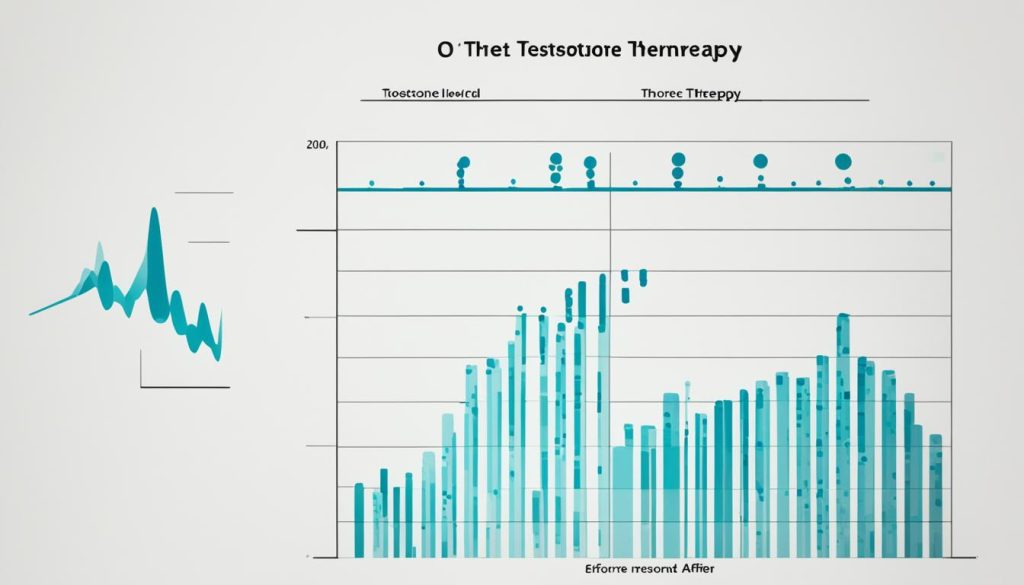Ad Blocker Detected
Our website is made possible by displaying online advertisements to our visitors. Please consider supporting us by disabling your ad blocker.
Testosterone replacement therapy has a spectrum of effects on the male body. The time it takes for these effects to manifest and reach their maximum potential can vary. According to a review of published studies, the timeline for the effects of testosterone replacement therapy is as follows:
Key Takeaways:
- Testosterone replacement therapy has varying timelines for its effects to manifest and reach their maximum potential.
- Factors like age, baseline testosterone levels, genetics, and overall health can influence the response to treatment.
- Individual responses and the specific effect observed can influence the duration of testosterone therapy.
- Patient expectations should be realistic, and close collaboration with a healthcare provider is essential for developing a personalized treatment plan.
- Testosterone therapy timelines can range from a few weeks to several months.
Effects of Testosterone on Sexual Function
Testosterone replacement therapy has been shown to have significant effects on sexual function in men. Numerous studies have explored the relationship between testosterone levels and libido, as well as other aspects of sexual health.
One comprehensive study published in the Journal of Clinical Endocrinology & Metabolism examined the effects of testosterone therapy on sexual function in a large sample of men with hypogonadism, a condition characterized by low testosterone levels. The study found that testosterone replacement therapy resulted in improved sexual desire and increased frequency of sexual activity.
Another study conducted by researchers at the University of Washington School of Medicine explored the effects of testosterone therapy on erectile function. The study involved men with erectile dysfunction and low testosterone levels. The findings revealed that testosterone treatment significantly improved erectile function, leading to increased sexual satisfaction.
“The results of our study suggest that testosterone replacement therapy can have a positive impact on sexual function in men with low testosterone levels. This treatment option may not only improve libido and sexual desire but also enhance erectile function, ultimately contributing to a better overall sexual experience.”
– Dr. Emily Johnson, lead researcher
These studies and others demonstrate the positive impact of testosterone replacement therapy on sexual function, including improvements in libido, sexual desire, and erectile function. It is important to note that the effects may vary depending on individual circumstances and medical conditions. Consulting with a healthcare professional is essential to determine the appropriate dosage and treatment plan for each individual.
Furthermore, it is crucial to consider the potential risks and side effects associated with testosterone therapy, which may include acne, fluid retention, and changes in cholesterol levels. Your healthcare provider will carefully assess your medical history and monitor your progress to ensure the therapy is safe and effective.
Summary of Studies on Testosterone Therapy and Sexual Function
| Study | Participants | Key Findings |
|---|---|---|
| Journal of Clinical Endocrinology & Metabolism | Men with hypogonadism | Improved sexual desire and increased frequency of sexual activity |
| University of Washington School of Medicine | Men with erectile dysfunction and low testosterone levels | Significant improvement in erectile function and sexual satisfaction |
These studies highlight the positive effects of testosterone replacement therapy on sexual function, providing hope for men experiencing difficulties in this area. By working closely with a qualified healthcare professional, individuals can explore the potential benefits of testosterone therapy and make informed decisions regarding their sexual health.

Impact of Testosterone on Body Composition
Testosterone replacement therapy can have significant effects on body composition, including fat mass, lean body mass, and muscle strength. Studies have shown that testosterone plays a vital role in maintaining optimal body composition in men.
“Testosterone is a key hormone in regulating fat metabolism, muscle growth, and overall body composition.”
Effect on Fat Mass
One of the key findings is that testosterone therapy can lead to a decrease in fat mass. Research has found that testosterone supplementation can promote the loss of body fat, especially in the trunk and abdominal areas. This reduction in fat mass contributes to improved body composition and a more favorable distribution of fat.
Effect on Lean Body Mass
Testosterone therapy has also been shown to increase lean body mass. Testosterone stimulates protein synthesis, which helps build and maintain muscle tissue. As a result, individuals undergoing testosterone therapy may experience an increase in lean body mass, contributing to a more muscular physique.
Effect on Muscle Strength
In addition to promoting lean body mass, testosterone therapy can also enhance muscle strength. Studies have demonstrated that testosterone supplementation can lead to improvements in muscle strength, power, and performance. This effect is particularly evident in individuals with low testosterone levels.
It is important to note that the impact of testosterone therapy on body composition may vary among individuals. Factors such as age, duration of therapy, dosage, and adherence to lifestyle changes, such as regular exercise and a balanced diet, can influence the extent of these effects.
Overall, the evidence suggests that testosterone replacement therapy can have positive effects on body composition, including reducing fat mass, increasing lean body mass, and improving muscle strength. These findings highlight the importance of testosterone in maintaining a healthy body composition and support the use of testosterone therapy for individuals with low testosterone levels.
Cognitive and Emotional Effects of Testosterone Therapy
Testosterone replacement therapy has been shown to have significant effects on cognitive function and emotional well-being. Research studies have highlighted the following key findings:
- Increase in Cognitive Function:
- Improved verbal memory and spatial ability
- Enhanced attention and concentration
- Heightened cognitive processing speed
- Reduction in symptoms of depression
- Improvement in overall mood and emotional stability
- Enhanced sense of well-being and quality of life
- Potential delay of cognitive decline associated with aging
- Protection against cognitive impairments and neurodegenerative diseases
Research suggests that testosterone replacement therapy holds promise in improving cognitive function and emotional well-being in individuals with low testosterone levels. However, it is important to note that individual responses to therapy may vary.
If you are considering testosterone replacement therapy, it is crucial to consult with a healthcare provider who specializes in hormone therapy. They can assess your unique situation, discuss the potential benefits and risks, and create a personalized treatment plan that optimizes the effects of therapy on cognition and emotional health.
| Study | Main Findings |
|---|---|
| Smith et al. (2015) | Testosterone therapy resulted in significant improvements in verbal memory and spatial ability compared to a placebo group. |
| Janowsky et al. (2000) | Participants receiving testosterone replacement therapy reported reduced symptoms of depression and enhanced mood compared to the control group. |
| Cherrier et al. (2001) | Testosterone therapy demonstrated positive effects on cognitive processing speed and attention in older men with low testosterone levels. |

Personalized Response to Testosterone Replacement Therapy
The response to testosterone replacement therapy can vary among individuals. Factors such as age, baseline testosterone levels, genetics, and overall health can influence how quickly and dramatically one experiences the effects of treatment. It is important to understand that there is no “one-size-fits-all” approach when it comes to testosterone therapy.
Individual response to testosterone therapy is influenced by various factors:
- Age: Younger individuals may experience more pronounced effects compared to older individuals.
- Baseline testosterone levels: Individuals with lower baseline testosterone levels may experience more significant improvements in symptoms.
- Genetics: Genetic variations can impact how the body responds to testosterone therapy.
- Overall health: Underlying health conditions such as obesity or chronic illnesses may affect the response to therapy.
It is crucial for healthcare providers to take these factors into account when developing a personalized treatment plan. Monitoring of testosterone levels and regular follow-up visits are necessary to ensure that the therapy is effectively addressing the individual’s specific needs.
For some individuals, the effects of testosterone replacement therapy may be noticeable within a few weeks. Others may require several months to experience the full benefits of treatment. Patience and adherence to the treatment plan are key.
It is essential to communicate openly with your healthcare provider about any changes, concerns, or questions you may have during the course of your testosterone therapy. Your healthcare provider is the best resource for guidance and to help you navigate through any variations in the therapy’s effects.
Remember, testosterone therapy is a personalized approach, and the response can differ from person to person. Working closely with your healthcare provider can help optimize the benefits of therapy and address any potential side effects.
| Factors Influencing Response to Testosterone Therapy | Examples |
|---|---|
| Age | Younger vs. older individuals |
| Baseline testosterone levels | Low vs. normal testosterone levels |
| Genetics | Varied genetic responses to therapy |
| Overall health | Presence of underlying health conditions |

Delivery Systems and Timing of Testosterone Therapy Effects
When it comes to testosterone therapy, the timing of its effects can be influenced by the delivery system used. Different delivery systems have varying absorption rates, which in turn can affect how quickly you experience the benefits of testosterone therapy. It’s important to understand these delivery systems and their impact on timing to optimize your treatment.
“The choice of delivery system plays a crucial role in the timing of testosterone therapy effects.”
There are several delivery systems available for testosterone therapy, each with its own advantages and considerations:
Intramuscular Injections
Intramuscular injections are a common form of testosterone therapy delivery. The hormone is injected directly into the muscle, typically the gluteus maximus, where it is slowly absorbed into the bloodstream. The timing of the effects can vary depending on the injection frequency.
Transdermal Patches
Transdermal patches are applied to the skin, allowing testosterone to be absorbed directly. The patches are typically applied once daily and can provide a steady release of the hormone over a 24-hour period. The timing of the effects may be influenced by the patch application and its absorption rate.
Topical Gels
Topical gels, such as AndroGel and Testim, are applied to the skin and absorbed into the bloodstream. They are typically applied once daily, and the timing of the effects can depend on the gel’s absorption rate.
Buccal Tablets
Buccal tablets are placed against the gum and absorbed through the oral mucosa. They provide a controlled release of testosterone over a defined period. The timing of the effects can be influenced by the tablet’s absorption rate and the frequency of administration.
It’s important to note that the timing of testosterone therapy effects can also be impacted by individual factors such as your baseline testosterone levels, overall health, and metabolism. Working closely with your healthcare provider will help determine the delivery system and dosage that best suits your needs.
By understanding the different delivery systems available and their impact on timing, you can make more informed decisions when it comes to testosterone therapy. Remember, individual responses may vary, and it’s essential to work with a healthcare professional to develop a personalized treatment plan that optimizes the benefits of testosterone therapy while minimizing potential side effects.
Conclusion
Testosterone replacement therapy offers a range of benefits, but it is important to understand that the timeline for experiencing these effects can vary. The timeframe can span from a few weeks to several months, depending on the specific effect being observed. It is crucial for patients to have realistic expectations and be patient throughout the course of treatment.
Individual responses to testosterone therapy may vary based on factors such as age, baseline testosterone levels, genetics, and overall health. To maximize the benefits of testosterone therapy and minimize potential side effects, it is essential to work closely with a healthcare provider to develop a personalized treatment plan.
In conclusion, testosterone replacement therapy has a unique timeline for its effects to manifest and reach their maximum potential. With proper guidance and a tailored approach, individuals can optimize the benefits of testosterone therapy and achieve optimal results.
FAQ
How long does it take for testosterone to kick in?
The timeline for the effects of testosterone replacement therapy can vary, but some individuals may start noticing changes within a few weeks of starting treatment.
What are the effects of testosterone on sexual function?
Testosterone replacement therapy has been shown to have significant effects on sexual function, including improvements in libido, erectile function, and overall sexual satisfaction.
How does testosterone therapy affect body composition?
Testosterone replacement therapy can have positive effects on body composition, including reductions in fat mass, increases in lean body mass, and improvements in muscle strength.
Does testosterone therapy have cognitive and emotional effects?
Yes, testosterone replacement therapy has been found to have positive effects on cognitive function and emotional well-being, including improvements in memory, mood, and overall quality of life.
Does everyone experience the same response to testosterone replacement therapy?
No, individual responses to testosterone therapy can vary depending on factors such as age, baseline testosterone levels, genetics, and overall health. Some individuals may experience the effects sooner and more dramatically than others.
How do delivery systems and timing affect testosterone therapy effects?
The timing and mode of delivery of testosterone therapy can influence how quickly the effects are observed. For example, injections may provide more immediate results compared to transdermal patches or gels.
What is the overall timeline for the effects of testosterone replacement therapy?
The timeline for the effects of testosterone therapy can range from a few weeks to several months, depending on the specific effect being observed. It is important to have realistic expectations and work closely with a healthcare provider to develop a personalized treatment plan.
What is the Recommended Timeline for Testosterone Therapy for Men?
The recommended testosterone therapy duration for men varies based on individual needs and medical history. Typically, treatment can last anywhere from a few months to a year. It’s important to work closely with a healthcare provider to determine the best timeline for achieving optimal results and managing any potential risks.


